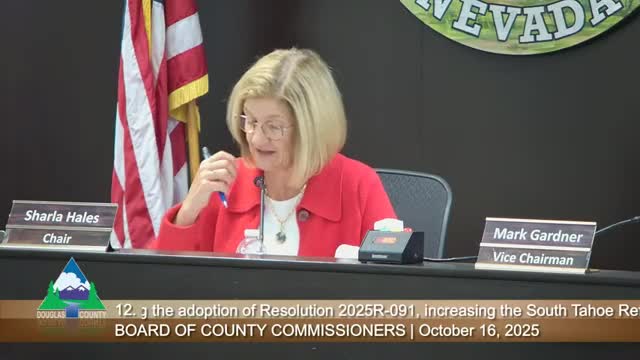Douglas County adopts 9.69% cumulative trash rate increase for Tahoe Township for 2026
Get AI-powered insights, summaries, and transcripts
Subscribe
Summary
The board adopted Resolution 2025R‑091 to increase South Tahoe Refuse rates by an interim CPI‑based adjustment (5%) plus a previously approved change for three‑cart collection, yielding a 9.69% total increase for calendar year 2026; the franchise yields a 3% county franchise fee on collected revenue.
The Douglas County Board of County Commissioners adopted Resolution 2025R‑091 to increase South Tahoe Refuse Company’s rates in the Tahoe Township for calendar year 2026 by a cumulative 9.69%.
Background and rationale: Phil Ricker, director of Public Works, explained the franchise’s rate-setting process. The South Lake Tahoe Basin Waste Management Authority (a three-member joint powers authority including Douglas County) engaged Crowe LLP for the rate study; interim year adjustments are driven primarily by changes in the Consumer Price Index and tipping fees at regional landfills. Crowe’s analysis used a CPI of 5.97% that translated into a 5% across-the-board adjustment, and combined with the separately approved three‑cart collection implementation produces the 9.69% cumulative increase for 2026.
Board action and vote: Commissioner Gardner moved adoption of Resolution 2025R‑091; Commissioner Tarkanian seconded. The motion carried unanimously.
County franchise fee and comparative context: Ricker noted Douglas County receives a 3% franchise fee on revenue from residents served by South Tahoe Refuse. In public comment, residents questioned why South Tahoe refuse rates are higher than some neighboring jurisdictions; staff explained differences in landfill ownership, tipping fees and the cost of operating in a mountain community with seasonal access and voluntary service (many nearby jurisdictions operate mandatory collection or control their own landfills). County staff and the company representative said Lockwood (Reno/Sparks) and Carson disposal sites and operational costs drive rates; the board heard that manual collection, snow-season operations and lower route density in mountain areas make per‑household costs higher than valley systems.
Ending: The resolution passed unanimously; the increased rate schedule will take effect for the 2026 calendar year, and the county will continue to receive the statutory franchise fee on revenue collected.
